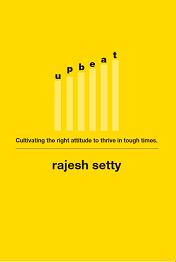
I’m not talking about swine flu. I’m talking about the wrong kind of ideavirus. The kind of negative thinking that’s highly contagious – and highly dangerous.
Fortunately, Lateral Action columnist Rajesh Setty has both the diagnosis and prescription in his latest book: Upbeat – cultivating the right attitude to thrive in tough times.
Raj points out that the current recession can be an unmitigated nightmare, a challenge, or even a blessing in disguise – depending on our attitude to the challenges you face.
Every day, a positive attitude can be either boosted or damaged by apparently inconsequential conversations. The words we exchange are as invisible as the tiny germs that spread disease through casual contact.
As with any epidemic, containing it requires each of us to be vigilant:
Any single conversation has the potential to make a BIG difference in your life. We sat in back of your mind, think about the conversations you have had TODAY. You will be shocked at what you learn.
For the last few days, most of my phone calls start with some variation of the following:
1. How is the market treating you?
2. What do you think about where the market is going?
3. The economy is VERY bad, don’t know what else will occur …
Too many conversations like this, and we risk starting a ‘sympathy exchange movement’:
The “sympathy exchange” movement is in full swing. You may have already joined that movement or be tempted to join it sooner than later. The criteria for joining this movement involves nothing more than actively giving and receiving sympathy during these tough times. There are no fees to be paid – just your precious time to actively participate and recruit others into the movement!
These passages are typical of Raj’s style – hard-hitting wisdom delivered with a smile. Like all the best teachers, he shows us where we are going wrong without being judgmental, and shows us a practical, achievable alternative.
Raj prescribes four key elements of an upbeat attitude:
- The Discipline – being determined, flexible and accountable for our own situation
- The Network – building our networks through generosity and gratitude
- The Strategy – re-prioritizing ruthlessly to solve core problems and open up new opportunities
- The Action – doing what it takes to succeed
The main text of the book is followed by the ‘Upbeat DIY Handbook’, with specific practical suggestions for putting each of these principles into action.
If you doubt whether attitude really makes a difference, check out this video (found via Career Renegade) featuring people in the advertising industry who have responded to redundancy by treating it as an opportunity.
Raj’s book is short, sharp and likely to have a long-lasting impact. It’s one of those books you read quickly but keep returning to. It’s been several weeks since I first read it, but the ideas keep popping into my mind when I’m facing a tricky situation or having a ‘bad day’.
The cover is what I call Mr. Happy yellow. It makes me think of sunshine and vitamin C. Exactly the kind of thing to boost your mental immune system.
Get your copy now and put a ray of sunshine in your pocket as you approach the challenges you face today. Or better yet, order several copies and start spreading the antidote to the ideavirus, by handing them out to your colleagues, customers and friends.
And there’s plenty more inspiration from Raj on his blog Life Beyond Code and on Twitter @upbeatnow.

Without having read the book yet, I agree that attitude has much to do with success — not through cosmic connections or laws of attraction — simply because pessimism is not conducive to risk-taking or even commerce in general. The global economy is based on value-added transactions that in turn depend on the idea that the purchase will lead to some future benefit.
Optimism is critical for many of these transactions to take place. Without it, buyers begin to cocoon themselves and we experience what we have today…recession. Obviously, attitude is not everything, but it is important in increasing that perceived future value.
http://pmug.wordpress.com/2009/08/20/marketing-optimism/
I do agree that we can easily get caught up in gloomy conversation.
However, I tend to think that the best strategy for success in all economic climates is not to cultivate a rigidly positive attitude, but an attitude that is beyond both positive and negative thinking.
This could mean basing one’s actions on solid principles that basically do not change, such as hard work and empathy. Or it could be cultivated through practices of equanimity, noticing ups and downs (in mood, economic conditions, etc.) without reacting.
Seeing and accepting things how they are and looking for ways to act effectively in the world are both useful ways of thinking no matter whether in boom or bust times.
Jason, thank you for the comments.
Duff, yes – definitely agreed – being optimistic does not mean that you have to shy away from reality. That would be irresponsible.
Best,
Raj
This is so true, people worry about the economy, terrorism, the neighbours, teenage crime, asteroids hitting the earth but especially where I live in the UK, the weather.
So what its raining, or it may rain later or tomorrow. Live with it, get on with your live!
Its all about attitude! Thats where it starts and you can pay Tony Robbins hundreds of dollars to tell you that!